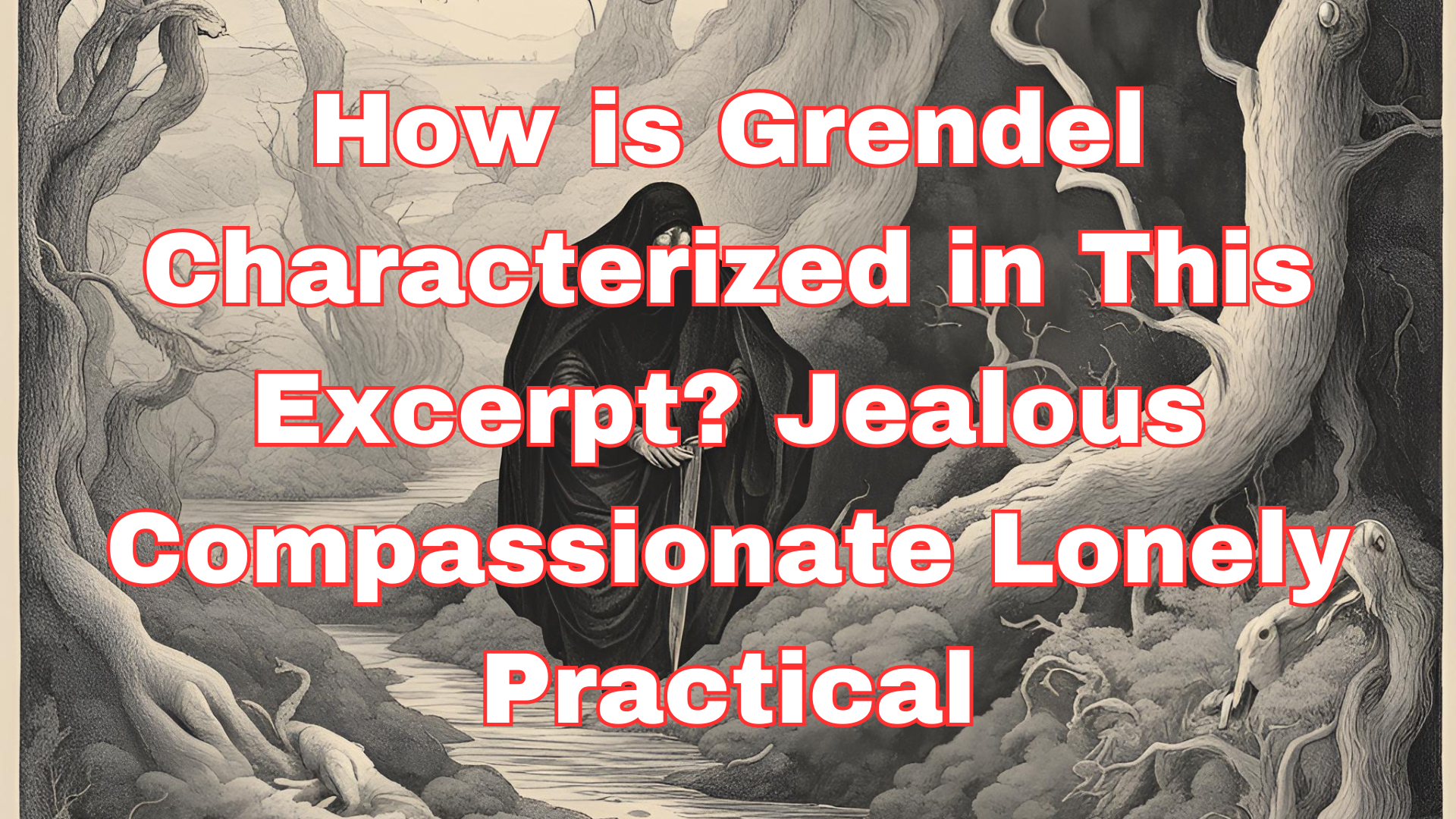How is Grendel Characterized in This Excerpt? Exploring Jealousy, Compassion, Loneliness, and Practicality
The question: how is grendel characterized in this excerpt? jealous compassionate lonely practical. Grendel, one of the most iconic figures in literature, is a character from the Old English epic poem “Beowulf.” This article delves into the characterization of Grendel in a specific excerpt, exploring how he embodies traits such as jealousy, compassion, loneliness, and practicality. Understanding these traits provides a nuanced perspective of Grendel, highlighting the complexity of his character.
Grendel’s Jealousy
Root of Grendel’s Jealousy Grendel’s jealousy is deeply rooted in his feelings of inadequacy and resentment. Observing the warriors in Heorot, Grendel is envious of their joy, camaraderie, and the celebrations they hold, which starkly contrast with his own solitary existence. This jealousy is not merely an abstract emotion; it is a visceral response to his exclusion from the human world.
Impact of Jealousy on Grendel’s Actions Grendel’s jealousy drives him to attack Heorot. His violent actions are a direct result of his desire to disrupt the happiness he cannot share. By attacking the hall, Grendel attempts to assert some control over a world that continually rejects him.
Comparison with Human Emotions While Grendel is a monstrous figure, his jealousy is a very human trait. This emotion makes him relatable, as jealousy is a common feeling experienced by many. It adds depth to his character, making him more than just a one-dimensional antagonist.
Grendel’s Compassion
Instances of Compassion in Grendel Despite being primarily depicted as a monster, there are moments in the text that suggest Grendel possesses a sense of compassion. He exhibits a longing for connection and an understanding of human emotions. These moments, though fleeting, indicate that Grendel is not entirely devoid of humane traits.
Internal Conflict Between Monstrous and Humane Traits Grendel’s compassionate side reveals an internal conflict. He is torn between his monstrous nature and a desire for empathy and understanding. This conflict adds complexity to his character, suggesting that his violent behavior may stem from a deeper struggle with his identity.
Significance of Compassion in Grendel’s Characterization The moments of compassion humanize Grendel and elicit a sense of pity from the audience. They show that he is not purely evil but is instead grappling with emotions that make him a tragic figure.
Grendel’s Loneliness
Grendel’s Isolation from Humans and His Own Kind Loneliness is a significant aspect of Grendel’s character. He is an outcast, shunned by both humans and other creatures. This isolation profoundly affects him, fueling his rage and driving his destructive actions.
Effects of Loneliness on Grendel’s Behavior Grendel’s loneliness leads to a cycle of violence. His need for acknowledgment and a sense of belonging pushes him to attack Heorot repeatedly. Each attack is not just an act of violence but a desperate attempt to bridge the gap between himself and the human world.
Symbolism of Loneliness in the Narrative Grendel’s loneliness symbolizes the broader theme of alienation in “Beowulf.” It reflects the existential struggle of being isolated and misunderstood, a theme that resonates with many readers.
Grendel’s Practicality
Evidence of Grendel’s Strategic Thinking Grendel’s attacks on Heorot are not random acts of violence but are strategically planned. He observes the humans, learns their routines, and chooses moments to strike when he can cause maximum disruption.
How Practicality Distinguishes Grendel from a Mere Brute This strategic thinking highlights Grendel’s intelligence. Unlike a mindless beast, Grendel is capable of planning and executing his attacks with precision. This practicality sets him apart as a formidable adversary.
Analysis of Grendel’s Intelligence and Adaptability Grendel’s ability to adapt to his environment and learn from his observations demonstrates his intelligence. This adaptability is crucial for his survival and underscores the complexity of his character.
Conclusion
Grendel’s characterization in the excerpt from “Beowulf” reflects a complex interplay of jealousy, compassion, loneliness, and practicality. These traits combine to create a multifaceted character who elicits both fear and sympathy from the audience. Understanding Grendel’s jealousy and compassion provides insight into his internal struggles, while his loneliness and practicality reveal the depth of his intelligence and emotional complexity. This nuanced portrayal makes Grendel one of literature’s most compelling and enduring figures.


